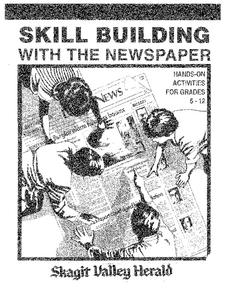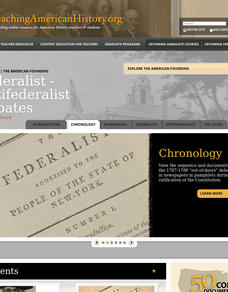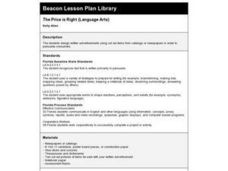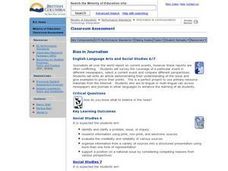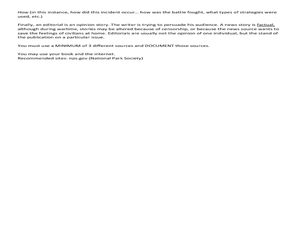Curated OER
In My Own Backyard
Students explore the soil and vegetation found in their home and/or school environment and map a familiar area. Each group is assigned a section of the schoolyard. They draw maps of their assigned places and gather soil and vegetation...
Smithsonian Institution
Spanish American War
Today, Cuba and America sometimes struggle with diplomatic relations, but did you know that America went to war against Spain to free Cuba? Learners examine many interesting facts related to the Spanish American War using an informative...
CJ Hatcher & Associates, Inc.
Skill Building with the Newspaper
Extra, extra, read all about it! Use a newspaper as the primary resource in a special education classroom to teach reading, writing, and math skills. The activities help class members build their reading skills as well as their knowledge...
Ashbrook Center at Ashland University
Federalist - Antifederalist Debates
Who should have the power—individual states or the federal government? Scholars research the arguments of the Federalists and Anti-Federalists during the formation of the United States Constitution. Online resources, including a vast...
Curated OER
You Can Be A Woman Meteorologist
Students complete four activities that are about meteorology. The first activity is for them to explore weather maps. The second activity is for students to discover high-pressure and low-pressure air. The third activity is for them to...
Curated OER
Prairie Voices: Community Development, Investigating Local History
Students investigate local history. In this research skills lesson, students examine historic landmarks, tax records, fire maps, town plans, historic photographs, newspapers, and other primary sources to learn about local communities in...
Curated OER
The Price is Right - Advertisements
Fourth graders design written advertisements using cut out items from catalogs or newspapers in order to persuade consumers.
Curated OER
Ocean Currents
Fourth graders work in groups to research ocean currents and create posters with their findings. They locate the patterns and names of major ocean currents and identify them on a map. Students also use red pencil to show ocean currents...
Curated OER
Famous Afro-Americans Historical Sites Recognized by the National Park System
Learners use the library to find historical information about each Afro-American. They use magazines, articles from newspapers, and oral histories from video tapes and slide presentations to write biographical sketches about each...
Curated OER
Bias in Journalism
Pupils evaluate the credibility and reliability of various sources. Students survey the coverage of a particular event in different newspapers, select a current event and compare different perspectives. They write an article...
Curated OER
Weather
Fourth graders study a map and locate cities, read information and create a chart. In this weather lesson students place appropriate weather information on a map and write a script using their information to relay the weather to the...
Curated OER
Discovering Your Community
Students focus on the origins of the families that make up their community by exploring their family's origins through themselves, parents, and grandparents. Students create a map marked with family origins for the class.
Curated OER
What Can We Discover About Colorado?
Students locate Colorado and its neighbors on a map (either in a book or on the Internet). They create a graphic that illustrates what they know and want to know about the state (KWL); finally, they draw and label Louisiana maps.
Curated OER
Weather
Pupils read a weather map. Using the local newspaper, Columbus Dispatch, small groups investigate that air has pressure and that temperature and pressure are inversely related in weather. They display their findings on a graph or...
Curated OER
Why Not Visit My Country?
Students research a country using the Travel Languages Web site. Using MS Publisher, they create a travel flyer about the country. Using Inspiration, they develop a concept map of what they learned about their country.
Curated OER
Natural Resources
Students use magazines and newspapers to examine the Earth's natural resources. They identify ways that natural resources are protected, threatened, managed and mismanaged. They find the location of each story on a world map and...
Curated OER
Voyage to the New World
Students examine the exploration of the New World. They write a descriptive account of the first encounter between Europeans and Native Americans, analyze and label maps, plot Columbus's journey on a map, and write a chapter summary.
Curated OER
To Walk the Sky Path
Fifth graders use maps of Florida. They locate places from a list on their map. Students use the places mentioned in the book, "To Walk the Sky Path," and locate them on the map. Students should have labeled a minimum of 10 places, and...
Curated OER
El Tiempo en Chile
Learners analyze what information would one expect to find in a weather report. They list in Spanish weather conditions for today in their community. Students visit Chile and locate it on a map.
Curated OER
What is a Watershed?
Students create a classroom size model of a landscape to define the concept of a river watersheds. They spread crumbled newspapers around the floor to simulate different elevations then cover the whole landscape with a sheet. They pour...
Curated OER
Human Footprint
Students study facts about humans and how they are impacting the Earth. In this investigative lesson students help map peoples footprints over the Earth's surface and evaluate these factors.
Curated OER
Reporting on a Battle
Young scholars report on battles of the Civil War. In this American Civil War lesson, students conduct research that allows them to report on selected battles of the war. Student's newspapers should include eyewitness statements,...
Curated OER
Reading the newspaper
Students read articles related to local, state, national, and world events using word maps.
Curated OER
Discover Your World
Fifth graders, in groups, locate a place on a map where the group would like to visit, research the place then write a complete report on the outcome of the findings. They groups must make a cooperative oral presentation to the class.




